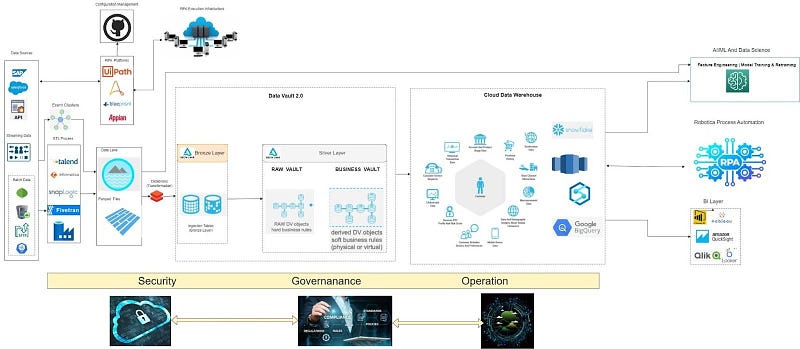Robotics Process Automation in Finance Industry
Overview:
Robotic process automation (RPA) is a software technology that makes it easy to build, deploy, and manage software robots that emulate human actions interacting with digital systems and software. Just like people, software robots can do things like understand what’s on a screen, complete the right keystrokes, navigate systems, identify and extract data, and perform a wide range of defined actions. But software robots can do it faster and more consistently than people, without the need to get up and stretch or take a coffee break.
Challenges:
Below are some the challenges businesses face which is addressed by RPA:
Inconsistent, nonstandard, and complex processes :
Processes typically evolve to meet the demands of internal and external customers using the tools, skill sets, and resources available. Consequently, processes vary depending on when, where, or by whom the process is performed and are often used on an ad hoc basis. Automating an inconsistent or nonstandard process can be complex, time-consuming, and often ineffective
Errors and rework:
The finance function is often the unwilling recipient of errors created upstream that must be corrected downstream. Automating error-filled processes might simply speed up and amplify the problems, creating pileups in finance.
Sub Optimized ERP systems:
Modern enterprise resource planning (ERP) systems are quite complex, and expertise on how to get the most out of these systems is hard to find. So relevant functionality that would support automation often goes unused.
Costly and complex enhancements:
Building enhancements to existing systems is a long, costly process, and finance is typically at the end of the line for help. Moreover, these modifications often create more problems than they solve if not managed properly.
Increased cost due to Manual Effort: Manual processing drives up overhead, lacks quality control, and increases fraudulent risk. This in turn increases the operation costs and time delays.
Solutions:
Detecting fraud usually depends on correlating data from multiple sources. Most organizations aren’t set up for examining transactions across silos, so even if they can detect that fraud is taking place, they have trouble proving or blocking it.
With analytics, companies can automate the testing of 100% of data points, then identify outliers that indicate risk and investigate further. With insight into real-time, transactional data, investigators can readily see fraud as it is occurring and take immediate action to reduce the losses stemming from the fraud.
Machine Learning provides a scalable machine learning platform, where data from past fraud can be used to predict future fraud. This will even recommend a machine learning model that best fits the data and goal. Once the model is created, you can use that model to predict fraud in future transactions.
Business Architecture:

Technical Data Architecture

**Detailed Architecture: Enroll your interest “Contact Us”
Benefits:
1. Accelerated transformation : RPA is a major component in digital transformation.
2. Major cost savings: RPA drives rapid, significant improvement to business metrics across industries and around the world.
3. Greater resilience : RPA robots can ramp up quickly to match workload peaks and respond to big demand spikes.
4. Higher accuracy : The main feature of robotic process automation is its power to eliminate processing errors. As long as the business processes are properly optimized and accurately mapped, businesses need not be concerned that the robots will make errors.
5. Improved compliance : 92% agree RPA has ‘met or exceeded expectations’ for better compliance
6. Boosted productivity: Manual tasks consume a significant amount of time and energy, so staff can’t accomplish as much in a day. When you configure RPA bots properly for a workflow, they can increase a team’s capacity for completed work
7. More value from personnel : RPA enables people to focus on more strategic work.
8. Happier employees: RPA increases employee engagement.
9. Advanced Governance
The RPA benefit of advanced governance has two levels:
- An RPA system complies with a clear and precise governance system. Indeed, creating a well-considered governance structure is a key step in effective deployment of an RPA platform.
- RPA software can govern your larger system. That is, it can check and recheck and monitor systems continually. Just as humans monitor governance now (but with all the mistakes that humans make) an automated system can check and flag an activity in an enterprise infrastructure that does not comply with the current governance framework.
10. Enhanced Customer experience: When the work is completed faster with RPA bots it lessens a customer’s effort, gets the work right at the first time, and turns the work around faster, enhancing customer experience.
Results:
- 30–45 % Improved ROI
- 45% Increase in Productivity
- 80% Reduction in Errors
- 30% Improvement in Efficiency to Generate Savings
- 65% Increase in Compliance
What’s next?
Want to learn more.
We have number of solutions to help you to modernize your Data Warehouse.
1. Free Data Architecture Consultation
2. Pay as you go data resources
3. Robotic Process Automation
4. Data Warehouse Solution
5. Big Data and BI
Visit our website and contact us today.
Contact us today to learn how can Dlytica help you for your next step.
Contact Us : https://www.dlytica.com/contact-us/
Official Site : https://www.dlytica.com/
Linkedin : https://www.linkedin.com/company/dlytica/
Recent Post
Globally, most banks face one of the most significant issues with non-performing assets, or NPAs. For instance, the NPA ratio in India has decrea [...]
What Is a Sovereign AI Lakehouse Platform? A sovereign AI lakehouse platform unifies data lake and data warehouse capabilities with built‑in AI t [...]
Why Enterprises Are Choosing DataNature over Cloudera, Databricks, and Snowflake? Across Canada, banks, telcos, and public-sector organizations a [...]
Empowering businesses with unified data, intelligent automation, and real-time insights. Introduction: How an AI Data Platform Drives Enterprise [...]
Introduction Artificial Intelligence (AI) is quickly changing industries, and this is most obvious in the finance and banking worlds. From fraud [...]
Introduction In today’s digital environment, data-driven technologies are reshaping how companies operate. Every day, organizations produce enorm [...]
Introduction Customer data is growing at lightning speed, but making sense of it remains a challenge. This is where AI agents in customer analyti [...]
Introduction Big Data and AI are transforming the way businesses handle massive datasets. In today’s fast-paced digital world, organizations stru [...]
Introduction The Banking and Financial Services (BFSI) industry is at the edge of a major transformation. With rising customer expectations, incr [...]
Introduction In the rapidly evolving world of technology, the development of customized Large Language Models (LLMs) is a frontier being explored [...]
Introduction: In the rapidly evolving technology landscape, Data and Artificial Intelligence (AI) are reshaping industries and revolutionizing bu [...]
Introduction: Language is the glue that connects us in this digital age. From chatbots that converse with us to virtual assistants that understan [...]
In the modern business landscape, data is the new oil, powering decisions and strategies across sectors. Dlytica Inc., with its cutting-edge data [...]
Data Analyst: A Data Analyst scrutinizes numeric data to aid companies in making informed decisions. They are often the entry point for individua [...]
Introduction Collision 2023, the largest AI event of the year, served as a vibrant hub of innovation, collaboration, and knowledge-sharing. In th [...]
Overview Intelligent Document Processing (IDP) is an Artificial Intelligence (AI)-driven technology that is rapidly transforming the way business [...]
Overview In today’s fast-paced business world, companies generate a vast amount of data, most of which is stored in paper-based or unstructured d [...]
Overview The insurance industry generates a vast amount of unstructured, semi-structured and structured documents in the form of policies, claims [...]
Overview Intelligent Document Processing (IDP) refers to the use of Artificial Intelligence (AI) technologies to automate the data extraction pro [...]
In the digital age, businesses are constantly looking for ways to streamline their operations and increase efficiency. One area that holds great [...]
Overview: Intelligent Document Processing (IDP) refers to the automated process of analyzing, extracting, and categorizing data from various type [...]
Introduction: Cloud computing is a technology that allows users to store, access, and manage data and applications over the internet. Instead of [...]
Introduction to Resource Augmentation IT resource augmentation services are a growing trend in the business world, as organizations look for ways [...]
Introduction to Data Warehouse A data warehouse is a centralized repository of structured and organized data that is used for reporting, analysis [...]
Overview: Robotic process automation (RPA) is a software technology that makes it easy to build, deploy, and manage software robots that emulate [...]
How can AI automate Insurance Industry? In this article, you will learn : What is Insurance Claim Process Automation? Claims Processing is t [...]
What is CMAP? One of the premium solution provided by Dlytica is Cloud Migration Acceleration program (CMAP).Migrate to cloud with our suppo [...]
With an Innovative team at DLytica, we work on converting your Data Strategies to Solutions. We leverage a team of skilled Data Architects, Data [...]
Who are we? Company’s tagline : Drive your business with Data Analytics and AI with DLytica Inc. With an Innovative team at DLytica, we [...]
Overview: Fraud is evolving and nowadays it looks more like organized crime with international and cross-functional teams involved. It means that [...]
